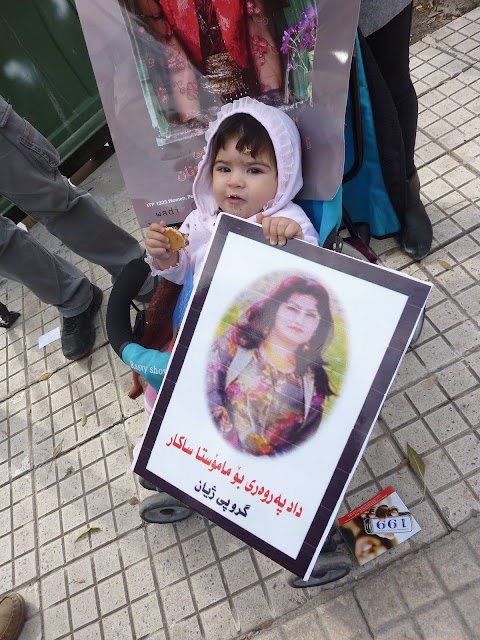"There is definitely a light at the end of the tunnel. And we are here for the long haul." - Hoda Elsadda
Zhiyan group representatives are never satisfied; they never rest when it comes to women’s issues. Last week they had a press conference to release results of a study about the impact of the so called “Amnesty Law” in cases of violence against women. The week before, they were in Kalar, Germian, to follow up the case of Nigar Rahim; a 15 year old raped by one of her brothers and murdered by another. I am not able to keep up with all of their work as I have an important role in documenting their work for our english speaking readers. Their meetings, events are always in Kurdish, but they always keep me involved despite the language barrier. I think is extremely important to have their work connected to the broader women rights struggle.
The meeting in Kalar was very positive, six representatives from Zhiyan group met with the investigator in the case of Nigar Rahim, along with many representatives of women organizations in Kalar. The organizations in Kalar expressed their readiness to be more active in Zhiyan group and to this end they selected a coordinator for the Germian area.
 |
| Meeting of Zhiyan Group in Kalar, Iraqi Kurdistan. Photo supplied by Zhiyan Group. |
Last year, Prime Minister Nechirvan Barzani established an investigation committee to follow up the case of Nigar. The group was composed by the case investigator, a representative from NGO’s, a representative from the High Committee of Women and a representative from the Directorate to Trace Violence Against Women (DTVAW). The group wrote a 2-page paper with recommendations about Nigar’s case and emphasized the need for a women’s shelter in Germian. Until now, the Prime Minister has not answered the committee regarding their recommendations.
The outcome of the meeting in Germian was very good, with NGO’s wanting to organize a demonstration to demand shelters in the area and the commitment to be present in the court hearings of Nigar’s case.
Zhiyan group also organized a press conference on May 5th in Culture Cafe, Suleimaniya. Under the title: “No to the release of women murders under the general Amnesty Law”, Zhyan group presented a new report which focuses on the release of women murders under the general Amnesty Law. The amnesty law has been controversial among various sectors of civil society, including women groups. The law is affecting women victims of violence in a significant way.
 |
| At the press conference on May 5th in Culture Cafe, Suleimaniya, Kurdistan-Iraq |
During the press conference, two members of Zhyan group presented the report which was prepared by DHRD. On 10th October 2012 a short version of this report was submitted to the presidency of Kurdish Parliament warning them about the dangers of this law on the women’s [rights] situation but there was no positive reaction .
Zhian group reported that 7 women murders were released because of this law among them the father of Sakar, a teacher who was killed by her father in 2012 .
The report reveals that perpetrators that are released under the amnesty law continue to commit crimes. This is the third time since 2003 that the amnesty law is in place. Women activists explained that honor killing is excluded from the amnesty process but that is easy to classify honor killings as another type of crime, They explained that the law is politically motivated is being implemented during the election process in order to buy votes. Zhiyan group members expressed the negative attitude that judges have towards women groups. In some instances when members of Zhiyan group attend the court hearings they are “laughed at” by lawyers or others because they are sure that perpetrators will “go out under the amnesty law”.





















